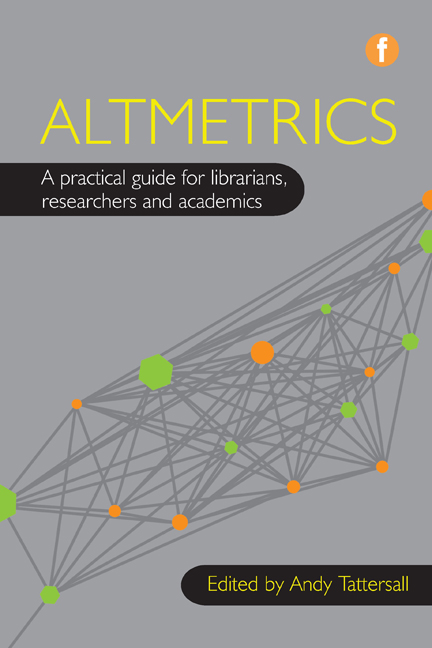Book contents
- Frontmatter
- Contents
- Contributors
- 1 Introduction
- 2 Road map: from Web 2.0 to altmetrics
- 3 ‘Metrics of the trade’: where have we come from?
- 4 The evolution of library metrics
- 5 The rise of altmetrics
- 6 Beyond bibliometrics: altmetrics reflects information about engagement with more types of scholarly content from more types of consumers
- 7 Considerations for implementing new technologies
- 8 Resources and tools
- 9 The connected academic: implementing altmetrics within your organization
- 10 Appmetrics: improving impact on the go
- 11 Open peer review
- 12 Conclusion
- Index
11 - Open peer review
Published online by Cambridge University Press: 08 June 2018
- Frontmatter
- Contents
- Contributors
- 1 Introduction
- 2 Road map: from Web 2.0 to altmetrics
- 3 ‘Metrics of the trade’: where have we come from?
- 4 The evolution of library metrics
- 5 The rise of altmetrics
- 6 Beyond bibliometrics: altmetrics reflects information about engagement with more types of scholarly content from more types of consumers
- 7 Considerations for implementing new technologies
- 8 Resources and tools
- 9 The connected academic: implementing altmetrics within your organization
- 10 Appmetrics: improving impact on the go
- 11 Open peer review
- 12 Conclusion
- Index
Summary
Introduction
The purpose of this chapter is to introduce readers to engagement by academics in open post-publication peer review of others’ research. This is not new, but this book would not be complete without some discussion of this growing area of interest, given that its major focus is on scholarly communication and measurement. This chapter will be of particular interest to LIS professionals who are involved in open access and scholarly communication work. It will explain what open peer review is, in all its variations, and discuss and review some of the main protagonists in this area. The chapter will explain why open peer review (in particular, post publication) is gaining interest. It will also discuss some of the barriers and opportunities presented by the opening up of academic research.
Main body
The term ‘peer review’ is likely to send shudders down the spines of most researchers who have ever edited, reviewed or written a piece of research. Yet it is a necessary part of the research process and without it we would see every Tom, Dick or Harry publish their work to a potential audience. Even so, there is plenty of evidence that fraudulent publishing still occurs, despite peer review existing in its present form. Peer review is a way of making sure that a piece of research is of good quality, thorough and fit for dissemination in the publication in question. There are several models of peer review in research, the most common being single blind, where the reviewers know the identity of the author(s). There is also double-blind peer review, where neither the author(s) nor the reviewers know each other's identity. Open peer review is where one or both of the parties involved are aware of each other's identity. Some platforms, such as PeerJ, encourage open peer review, but it is not a requirement. Usually, traditional peer review occurs before the research is published, for various reasons, the first being as a filter to ensure that the paper is right for the publication, that it is a rigorous piece of research and that it provides new evidence on that particular topic. Once the paper has been published the peer review usually ceases.
- Type
- Chapter
- Information
- AltmetricsA practical guide for librarians, researchers and academics, pp. 183 - 204Publisher: FacetPrint publication year: 2016



